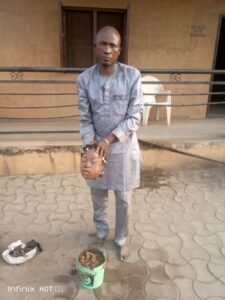Court discharges, acquits two suspected kidnappers over contradictory evidence
A High Court in Lokoja on Wednesday discharged and acquitted two suspected kidnappers over contradictory evidence provided by the prosecution counsel.
The trial Judge, Justice I.A. Jamil, while delivering judgment on the suit of alleged kidnapping label against Harrison Orubabe and Justice Yakubu, blamed the prosecution counsels for creating doubt in the mind of the court hence the discharge and acquittal of the suspects.
It was gathered that the prosecution counsels led by P.B. Daudu had arraigned Orubabe and Yakubu on Jan. 19 before justice Jamil on three count charges of conspiracy, kidnapping and robbery contrary to sections 97(1), 48(a)(b) and 298(a) of Kogi Penal Code Law 2019 respectively.
Daudu had presented confessional statements made by the accused through the Police IPO (PW2), who told the court that Investigation revealed that the suspects kidnapped their victim, Prosper Obanla, at Obajana in Kogi and took him to Warri in Delta State.
He claimed that the suspects also asked for a ransom of one million Naira from the victim’s father, Chief Olusegun Obanla (PW1), who must pay or have his son killed.
But through the objection and cross examinations of the prosecution witnesses including the victim ((PW3) by the defence Counsels, Barrister Martin Otojoko and Philip Idiok, the victim claimed he has never been to Warri as claimed by the police IPO (PW2)
Otojoko had also pointed out to the court another contradiction, where the confessional statements of the two accused clearly showed that the alleged victim sought the assistance of the accused to stage his kidnap to get some money from his rich father to buy a good phone.
The police claimed that in their confessional statements, Yakubu claimed that he and the victim went to Itope Train Station in Kogi, where he (Victim) boarded a train to Warri, Delta.
He said that the victim gave him N1,000 to return to Obajana.
The planned kidnap, he said, indeed paid off as they got N200,000 ransom paid by the supposed kidnap victim’s (Prosper) father, Chief Olusegun Obanla.
Justice Jamil held that there was a conflict or contradiction of evidence in relation to the consent or otherwise of the victim (PW3) in relation to the kidnap.
“The absence and consent of the victim is a material ingredient in proving an offence of kidnap, when properly defined.
“This court is in serious doubt as to whether PW3 (victim) was taken away into confinement by the accused persons without his consent or with his consent.
“Where a court is in doubt of a material fact necessary to to establish a commission of a crime by the defendant, the court can’t convict or same
“Similarly, where PW3 (victim) refused to agree to have gone to Warri just as the IPO PW2) in his witness statement said Investigations revealed that the two defendants took him to Warri, it’s difficult for this court to accept one version of the evidence.
“Again, the victim himself said that it wasn’t a kidnapping case as it was staged into order for him to get some money from his father. These set of evidences came from the prosecution.
“You, the prosecution, have put this court in doubt of what you are claiming such that I can accept one version and refuse the other.
“The implementation is that the prosecution has succeeded in creating doubt in the mind of the court, therefore causing the court to determine the case in favour of the accused.
“This is so because the prosecution could not prove what actually happened on Feb. 28, 2022 beyond reasonable doubt.
“On the whole, the prosecution has failed to prove beyond reasonable doubt any or all of the count charges labeled against the two suspects.
“Consequently, the two defendants are hereby discharged and acquitted,” the judge declared.
Shortly after the verdict, defence counsel, Mr Martin Otojoko described the judgment as “very sound” and “apt” considering the wisdom the judge applied in deciding the matter. Otojoko said that the judgement was a victory for the judiciary and the common man, whose hope is only in the judiciary.




